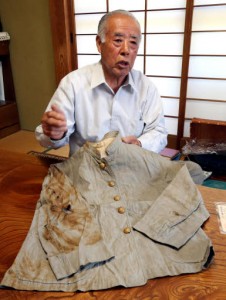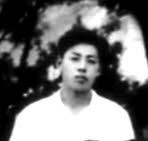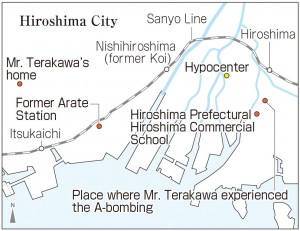Survivors’ Stories: Mitsuto Terakawa, 87, Saeki Ward, Hiroshima
May 9, 2018
Terrible burns on his face caused great suffering
by Yumi Kanazaki, Staff Writer
Mitsuto Terakawa, 87, showed me the school uniform he was wearing when he experienced the atomic bombing 73 years ago. One sleeve is burnt and the collar is stained with blood. The clothing is imbued with his memories of suffering from the severe burns he received as well as the love and tireless care of his family.
Mr. Terakawa was born the second son of a farming family in the village of Yahata (now part of Saeki Ward, Hiroshima). Back then, he was a second-year student at the Hiroshima Prefectural Hiroshima Commercial School (now Hiroshima Prefectural Hiroshima Commercial High School) but classes had been suspended because of the war. On August 6, 1945, his 15th birthday, he was mobilized to help tear down homes to create a fire lane in the event of air raids.
He was walking with a classmate to the school in Minami-machi (now part of Minami Ward) from Hiroshima Station. When they were by present-day Hijiyama-shita Station, about 1.8 kilometers from the hypocenter, there was a brilliant flash of light overhead. They rushed into an air raid shelter nearby, but the right side of his face, right arm, and the back of his head were directly exposed to the bomb’s heat rays.
Mr. Terakawa fled up Hijiyama Hill to escape and looked out at the city below. Flames were rising everywhere. He returned to Hiroshima Station and saw that the railroad ties were also on fire so the trains couldn’t run. Evading the flames of the city center, he took a roundabout way north and reach Koi Station (now Nishihiroshima Station). “People were swarming around the tap water at the platform,” he recalled. “I tried to cool my wounds with the water there. This memory always comes back to me when I’m riding the train and it passes through Nishihiroshima Station.”
Beyond Arate Station (now Kusatsuminami Station), trams were running. As he hung onto an overcrowded tram, his sagging burnt cheek flapped in the wind and he groaned with pain. That evening he was finally reunited with his father, who was anxiously waiting for him at Itsukaichi Station.
Then came the toughest part of his ordeal. He fell unconscious for three days. He woke up to the sound of his grandmother’s tearful voice, saying, “You poor thing. Your handsome face is ruined.” When he looked at his face in the mirror, he saw that the right half was burnt and swollen. As maggots wriggled on his cheek and under his nose, he felt despair. He said, “It wasn’t only the pain I suffered. I had to endure the stink of pus and such intense itching.” He also struggled with diarrhea and fatigue from his exposure to the bomb’s radiation. He lay bedridden.
Mr. Terakawa’s mother, Fujiyo, did everything she could for him. She even picked up human bones from a crematory, ground them into powder and mixed this with oil, then spread the paste on his cheek. Gradually, miraculously, his scars began to heal.
In the spring of the following year, he returned to the Commercial School and learned that 137 students and teachers of the school had lost their lives in the atomic bombing. “Many people were also wounded in the bombing and their efforts to go on with their lives were very encouraging to me,” he said.
Then, when the school system underwent reform, he attended Kanon High School (in Nishi Ward) for a year. “Boys and girls were learning in the same classroom together, and we elected members for the student council. Those things were unthinkable during the war. I thought democracy was a wonderful thing.”
Mr. Terakawa was an active and athletic person. While teaching physical education classes at an elementary school, he graduated from college with a teaching certificate. In 1954, he married Kazuko, now 84, and was blessed with two daughters. After he retired, as the principal of an elementary school, he kept busy by helping the sports association of his local school district and organizing activities to protect schoolchildren.
His late mother never told him why she kept his school uniform, but he thinks it was because “she hated the folly of war, how people, even children, are killed indiscriminately.” When asked, he shares his account of the atomic bombing in his community, showing his old school uniform and telling listeners to “learn from the mistakes of history.”
In July 1945, a U.S. fighter jet crashed in the Hiroshima area and Mr. Terakawa saw that American soldiers who had bailed out were being held in his village. “But I believed they were enemies and I was afraid to go near them.” The soldiers were brought to Hiroshima as prisoners of war and then lost their lives in the atomic bombing the next month. Mr. Terkawa stresses, “We should never return to a time of war. Nations, and people, must get along with one another to keep the peace. Holding weapons, and threatening to use them, prevents us from becoming true friends. Nuclear weapons should be abolished completely.”
Teenagers’ Impressions
I want to think of a way to help convey his message
Though Mr. Terakawa was burned badly on his face and his arm, the scars are hardly noticeable now. I think his family’s diligent care brought about a miracle. It’s not easy for us, living in today’s world, to imagine the feelings of a 15-year-old boy who was suddenly forced to endure a horrible experience because of the war. I would like to understand his feelings as much as I can, and think of a way to put his experience in my own words and convey that message to the people around me. (Tokitsuna Kawagishi, 16)
I learned about the problem of nuclear deterrence
“Countries need to get along with one another, but possessing nuclear arms hinders the development of friendly relations.” These are the words that struck me most as Mr. Terakawa told us his story. My understanding is that nuclear weapons themselves arouse mutual distrust, and that’s why it isn’t okay to keep them, even if they aren’t used. For this reason, we have to abolish nuclear weapons. Mr. Terakawa explained the idea of “nuclear deterrence” to us in simple terms so we could easily understand the problem. Later, when I saw news about the summit between North Korea and South Korea, I thought what Mr. Terakawa said was right. (Riho Kito, 17)
(Originally published on May 9, 2018)
by Yumi Kanazaki, Staff Writer
Mitsuto Terakawa, 87, showed me the school uniform he was wearing when he experienced the atomic bombing 73 years ago. One sleeve is burnt and the collar is stained with blood. The clothing is imbued with his memories of suffering from the severe burns he received as well as the love and tireless care of his family.
Mr. Terakawa was born the second son of a farming family in the village of Yahata (now part of Saeki Ward, Hiroshima). Back then, he was a second-year student at the Hiroshima Prefectural Hiroshima Commercial School (now Hiroshima Prefectural Hiroshima Commercial High School) but classes had been suspended because of the war. On August 6, 1945, his 15th birthday, he was mobilized to help tear down homes to create a fire lane in the event of air raids.
He was walking with a classmate to the school in Minami-machi (now part of Minami Ward) from Hiroshima Station. When they were by present-day Hijiyama-shita Station, about 1.8 kilometers from the hypocenter, there was a brilliant flash of light overhead. They rushed into an air raid shelter nearby, but the right side of his face, right arm, and the back of his head were directly exposed to the bomb’s heat rays.
Mr. Terakawa fled up Hijiyama Hill to escape and looked out at the city below. Flames were rising everywhere. He returned to Hiroshima Station and saw that the railroad ties were also on fire so the trains couldn’t run. Evading the flames of the city center, he took a roundabout way north and reach Koi Station (now Nishihiroshima Station). “People were swarming around the tap water at the platform,” he recalled. “I tried to cool my wounds with the water there. This memory always comes back to me when I’m riding the train and it passes through Nishihiroshima Station.”
Beyond Arate Station (now Kusatsuminami Station), trams were running. As he hung onto an overcrowded tram, his sagging burnt cheek flapped in the wind and he groaned with pain. That evening he was finally reunited with his father, who was anxiously waiting for him at Itsukaichi Station.
Then came the toughest part of his ordeal. He fell unconscious for three days. He woke up to the sound of his grandmother’s tearful voice, saying, “You poor thing. Your handsome face is ruined.” When he looked at his face in the mirror, he saw that the right half was burnt and swollen. As maggots wriggled on his cheek and under his nose, he felt despair. He said, “It wasn’t only the pain I suffered. I had to endure the stink of pus and such intense itching.” He also struggled with diarrhea and fatigue from his exposure to the bomb’s radiation. He lay bedridden.
Mr. Terakawa’s mother, Fujiyo, did everything she could for him. She even picked up human bones from a crematory, ground them into powder and mixed this with oil, then spread the paste on his cheek. Gradually, miraculously, his scars began to heal.
In the spring of the following year, he returned to the Commercial School and learned that 137 students and teachers of the school had lost their lives in the atomic bombing. “Many people were also wounded in the bombing and their efforts to go on with their lives were very encouraging to me,” he said.
Then, when the school system underwent reform, he attended Kanon High School (in Nishi Ward) for a year. “Boys and girls were learning in the same classroom together, and we elected members for the student council. Those things were unthinkable during the war. I thought democracy was a wonderful thing.”
Mr. Terakawa was an active and athletic person. While teaching physical education classes at an elementary school, he graduated from college with a teaching certificate. In 1954, he married Kazuko, now 84, and was blessed with two daughters. After he retired, as the principal of an elementary school, he kept busy by helping the sports association of his local school district and organizing activities to protect schoolchildren.
His late mother never told him why she kept his school uniform, but he thinks it was because “she hated the folly of war, how people, even children, are killed indiscriminately.” When asked, he shares his account of the atomic bombing in his community, showing his old school uniform and telling listeners to “learn from the mistakes of history.”
In July 1945, a U.S. fighter jet crashed in the Hiroshima area and Mr. Terakawa saw that American soldiers who had bailed out were being held in his village. “But I believed they were enemies and I was afraid to go near them.” The soldiers were brought to Hiroshima as prisoners of war and then lost their lives in the atomic bombing the next month. Mr. Terkawa stresses, “We should never return to a time of war. Nations, and people, must get along with one another to keep the peace. Holding weapons, and threatening to use them, prevents us from becoming true friends. Nuclear weapons should be abolished completely.”
Teenagers’ Impressions
I want to think of a way to help convey his message
Though Mr. Terakawa was burned badly on his face and his arm, the scars are hardly noticeable now. I think his family’s diligent care brought about a miracle. It’s not easy for us, living in today’s world, to imagine the feelings of a 15-year-old boy who was suddenly forced to endure a horrible experience because of the war. I would like to understand his feelings as much as I can, and think of a way to put his experience in my own words and convey that message to the people around me. (Tokitsuna Kawagishi, 16)
I learned about the problem of nuclear deterrence
“Countries need to get along with one another, but possessing nuclear arms hinders the development of friendly relations.” These are the words that struck me most as Mr. Terakawa told us his story. My understanding is that nuclear weapons themselves arouse mutual distrust, and that’s why it isn’t okay to keep them, even if they aren’t used. For this reason, we have to abolish nuclear weapons. Mr. Terakawa explained the idea of “nuclear deterrence” to us in simple terms so we could easily understand the problem. Later, when I saw news about the summit between North Korea and South Korea, I thought what Mr. Terakawa said was right. (Riho Kito, 17)
(Originally published on May 9, 2018)










